The Yelkouan Shearwater Puffinus yelkouan is endemic to the Mediterranean and Black Seas, breeding from France and Algeria east to Greece and Bulgaria; breeding is also suspected in Turkey, but still not proven. It is currently listed as Vulnerable, because when last assessed it was considered to be undergoing a rapid population decline.
"Globally, it has an extremely large range (c. 3 million km2), and hence does not approach the thresholds for Vulnerable under the range size criteria (B and D2). Its population size is also moderately large (with 39 000 – 62 000 mature individuals in Europe alone and hence does not approach the thresholds for Vulnerable under the population size criteria (C and D1). Therefore, the only potentially relevant criterion is A, which relates to reductions in population size. Until recently, the population was thought to be declining rapidly at a rate which, if continued over three generations (54 years, based on a generation length estimated by BirdLife to be 18 years), may have resulted in an overall population decline of >30% (the threshold for listing as Vulnerable under criterion A).
New data collated from across Europe for the European Red List of Birds suggest that the species is no longer declining. A combination of official data reported by 27 EU Member States to the European Commission under Article 12 of the EU Birds Directive and comparable data from other European countries, provided by BirdLife Partners and other leading national ornithologists, suggest that the European breeding population is now increasing overall, with stable or increasing trends in those countries with the largest populations (Italy, Greece and Malta, which together hold c. 95% of the European breeding population). Consequently, the species is now classified as Least Concern at European level.
Europe holds >95% of the global breeding population and range, with the remainder in NW Africa, so the species’ status in Europe effectively determines its global status. Despite the threats perceived to be facing the species when last assessed (see current global factsheet for details), its population has not continued to decline overall. Furthermore, the increasing numbers reported from the breeding colonies correspond well with those counted moving through the Bosphorus in February (the non-breeding season), which have risen from 73 000 in 2012 to 90 000 in 2014. These increases may in part reflect recent investments in conservation projects to improve the species’ prospects, e.g. in Italy and Malta.
As the species is no longer declining, and seems unlikely to decline sufficiently rapidly in the near future to be listed as Near Threatened, it should be reclassified as globally Least Concern. Comments on this proposal are welcome.”

Yelkouan Shearwater
Information taken from BirdLife's Globally Threatened Bird Forum for Seabirds, which also includes expert commentary on the proposal.
References:
BirdLife International 2015. European Red List of Birds. Luxembourg: Office for Official Publications of the European Communities.
Carboneras, C., Jutglar, F. & Kirwan, G.M. 2014). Yelkouan Shearwater (Puffinus yelkouan). In: del Hoyo, J., Elliott, A., Sargatal, J., Christie, D.A. & de Juana, E. (Eds). Handbook of the Birds of the World Alive. Barcelona: Lynx Edicions.
John Cooper, ACAP Information Officer, 30 July 2015

 English
English  Français
Français  Español
Español